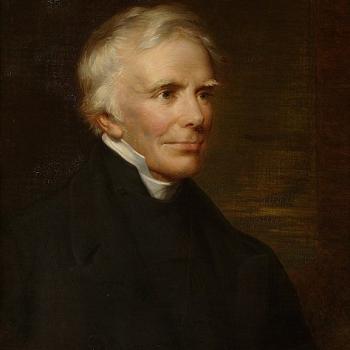I came across the preliminary basis for this argument (quite new to me), by perusing the work, Lectures on the Doctrines and Practices of the Roman Catholic Church, by Nicholas Cardinal Wiseman (London: J. S. Hodson, 1836), in preparation for my upcoming book (a collection of excerpts), Classic Catholic Biblical Apologetics: 1525-1925.
First, here is the Bible passage under consideration (RSV):
2 Timothy 3:14-17 But as for you, continue in what you have learned and have firmly believed, knowing from whom you learned it [15] and how from childhood you have been acquainted with the sacred writings which are able to instruct you for salvation through faith in Christ Jesus. [16] All scripture is inspired by God and profitable for teaching, for reproof, for correction, and for training in righteousness, [17] that the man of God may be complete, equipped for every good work.
On pages 208-209 of his book, Cardinal Wiseman comments upon it:
. . . it is manifest that St. Paul is speaking of the Scriptures here used, not as it has to be read and used for the individual instruction and edification of all the faithful, but as it is to be observed by pastors—for observe what he says; he says, expressly, it is profitable for those purposes which are the exclusive function of the ministry, and not of others, for the learners, for the subjects of the Church of Christ; for he says, it is “profitable for doctrine,” that is, as the word means in its proper native sense, “for teaching, for reproof, for correction, for instruction in righteousness.” Therefore, he is to hold fast the doctrines which St. Paul taught, remembering upon whose authority he received them— that is, the authority of the Apostles. . . . he is to know besides, that this Scripture is profitable for the practice of his ministry, for correcting, for reproving, for instructing. These are points not for individual improvement, not for each one’s edification; but they are essentially acts for the ministry of the priesthood, for those who have to teach others; and, consequently, if this text prove anything regarding Scripture, it only goes to prove that the pastors of the church should be familiar with it, and make use of it for the purpose of correcting, and edifying their flocks.
This (for me) was a new approach to the passage, and I was struck by how “individualistic” my take in the past had been: shot through with the casually non-institutional assumptions of my “low church evangelical” Protestant past. I had assumed without conscious analysis, that the “teaching,” “reproof,” “correction,” and “training” referred to came straight from the Bible to the individual, whereas Cardinal Wiseman noted that it specifically referred to priests and pastors teaching their flocks. The Bible was, in other words, profitable as the essential aid for Christian teachers (essentially priests) to learn, in order to pass on Christian doctrine to laypeople. That is far different from the populist, anti-institutional, or anti-sacerdotal notion of sola Scriptura: the “me, my Bible, and the Holy Spirit” mentality.
It’s very interesting also, how in the larger context (the two previous verses: 3:14-15) of the passage as usually cited in Protestant polemics in favor of sola Scriptura (3:16-17 only), we see clear reference to apostolic tradition (“continue in what you have learned and have firmly believed, knowing from whom you learned it”). St. Paul is talking about himself and how he passed on the Christian tradition to Timothy (compare his language about receiving and delivering tradition — including oral tradition — in 1 Cor 11:2, 23; 15:1-3; Gal 1:9; 1 Thess 2:13; 2 Thess 2:15; 3:6; 2 Tim 1:13-14; 2:2).
Now here comes my part in this “new” analysis of a very familiar passage (much-beloved by Protestants as a supposed “proof” of sola Scriptura). Having discovered a better way to analyze in a general way the root meaning of the verses here, it occurred to me that the phrase “man of God” may be a further clue or key as to what St. Paul’s intention was. I thought that it could very well be a description of the clergyman or person otherwise very specially devoted to serving God. And then I was curious how it was used elsewhere in Scripture. This turned out to be a very fruitful avenue indeed. hence, the (Catholic) Navarre Bible (commentary) on 1 Timothy 6:11, the only other place in the New Testament where the phrase appears (“But as for you, man of God, shun all this; aim at righteousness, godliness, faith, love, steadfastness, gentleness”):
“Man of God”: this expression was used in the Old Testament of men who performed some special God-given mission — for example, Moses (Deut 33:1; Ps 40:1), Samuel (1 Sam 9:6–7); Elijah and Elisha (1 Kings 17:18; 2 Kings 4:7, 27, 42). In the Pastoral Epistles (cf. also 2 Tim 3:17) it is applied to Timothy insofar as ordination has conferred on him a ministry in the Church.
Protestant reference works concur in the general sense of noting that the phrase was used in the Old Testament to refer to exceptionally prominent followers of God; not any believer at all. Accordingly, The Eerdmans Bible Dictionary (“Man of God”, p. 684) notes:
A designation for early prophets in Israel . . . The term is used of unnamed prophets (1 Sam. 2:27; 1 Kgs. 13; 2 Chr. 25:7, 9), Moses (Deut. 33:1; Josh. 14:6; 1 Chr. 23:14; 2 Chr. 30:1; Ezra 3:2), the angel of the Lord — thought to be a prophet (Judg. 13:6, 8), Samuel (1 Sam. 9:6-10), . . . Elijah (1 Kgs. 17:18, 24), and Elisha (e.g., 2 Kgs. 1:9-13; 5:8-15). In later periods the term apparently came to be applied to some, other than prophets, who were thought of as bearing some special relationship to God, such as David (Neh. 12:24, 36; cf. Jer. 35:4).
Likewise, Keil and Delitzsch‘ Commentary on the Old Testament, Vol. 5: Psalms, Part III, p. 48 — a renowned Lutheran work — (on Psalms 90), observes:
To the name, which could not be allowed to remain so bald, because next to Abraham he is the greatest man known to the Old Testament history of redemption, is added the title of honour [Hebrew] (as in Deut. xxxiii. 1, Josh. xiv. 6), an ancient name of the prophets which expresses the close relationship of fellowship with God, just as “servant of Jahve” [Yahweh] expresses the relationship of service, in accordance with the special office and in relation to the history of redemption, into which Jahve has taken the man and into which he himself has entered.
Wikipedia (“Man of God”) gives a nice and handy summary of the usage, noting that only Moses was given this title in the Torah (first five books). Clearly, it was not used of any Jewish believer. See the entirety of all of the passages with the phrase, from an online RSV search page.
The argument then becomes, of course, that Paul was referring specifically to Timothy (an apostle) and other “men of God” of like eminence (priests) in 1 Timothy 6:11 and 2 Timothy 3:14-17. If so, the authority of Scripture was specifically to be delegated through authoritative, ordained interpreters, in accordance with the larger apostolic tradition (2 Tim 3:14-15, etc.). This is quite different from sola Scriptura in its usual Protestant definitions, and it is precisely harmonious with (if not identical to) the Catholic “three-legged stool” of Church-Scripture-Tradition.
If we go even deeper into the passage and reflect on the terms used, the case is strengthened all the more. For example, “profitable for teaching” (2 Tim 3:16). Does this make more sense as describing the Bible, or rather, a teacher (the “man of God”) who is teaching from the Bible with authority? If we search “teach” or “taught” or “instructed” or any similar terms in the Bible, we are hard pressed to find them ever applied to a mere book. In every instance I have found so far, it is always applied as a description of a man or God teaching (at times using the Bible as an aid). Examples:
God Teaching Moses
Exodus 4:12, 15 Now therefore go, and I will be with your mouth and teach you what you shall speak. . . . [15] And you shall speak to him and put the words in his mouth; and I will be with your mouth and with his mouth, and will teach you what you shall do.
Deuteronomy 5:31 But you, stand here by me, and I will tell you all the commandment and the statutes and the ordinances which you shall teach them, that they may do them in the land which I give them to possess.
MosesExodus 18:20 and you shall teach them the statutes and the decisions, and make them know the way in which they must walk and what they must do.
Deuteronomy 4:1 And now, O Israel, give heed to the statutes and the ordinances which I teach you, and do them; that you may live, and go in and take possession of the land which the LORD, the God of your fathers, gives you.
Deuteronomy 4:14 And the LORD commanded me at that time to teach you statutes and ordinances, that you might do them in the land which you are going over to possess.
Deuteronomy 6:1 Now this is the commandment, the statutes and the ordinances which the LORD your God commanded me to teach you, that you may do them in the land to which you are going over, to possess it;
AaronLeviticus 10:11 and you are to teach the people of Israel all the statutes which the LORD has spoken to them by Moses.
The Levites
Deuteronomy 33:10 They shall teach Jacob thy ordinances, and Israel thy law; . . .
EzraEzra 7:10 For Ezra had set his heart to study the law of the LORD, and to do it, and to teach his statutes and ordinances in Israel.
Parents Teaching Children
Deuteronomy 6:7 and you shall teach them diligently to your children, and shall talk of them when you sit in your house, and when you walk by the way, and when you lie down, and when you rise. (cf. 11:19)
Eleven Disciples
Matthew 28:20 teaching them to observe all that I have commanded you . . .
Paul and BarnabasActs 15:35 But Paul and Barnabas remained in Antioch, teaching and preaching the word of the Lord, with many others also.
PaulActs 20:20 how I did not shrink from declaring to you anything that was profitable, and teaching you in public and from house to house,
Timothy1 Timothy 4:13 Till I come, attend to the public reading of scripture, to preaching, to teaching.(cf. 4:11, 16)
Elders
1 Timothy 5:17 Let the elders who rule well be considered worthy of double honor, especially those who labor in preaching and teaching;
I can’t find a single example of “the Bible taught” or some sense of teaching directly from the Bible, in Scripture itself. If anyone finds this, please let me know. Here are all the instances of “teach” in the Bible, and “taught”, and “instruct[ed]”, and “learn[ed]”.
When I search “word / teaches” to find some connection, I come up with nothing. When I search “”taught / word” I don’t get passages referring to learning directly from the Bible; rather, I find passages (again) about people teaching the Word:
Galatians 6:6 Let him who is taught the word share all good things with him who teaches.
Then when I found “word” and “taught” together in another instance, it turned out to be an astonishingly striking corroboration of the Catholic interpretation of 2 Timothy 3:16-17, in similar words, and reinforcing the concept of authoritative interpretation and teaching of the Bible, since it is about a bishop:
Titus 1:7-9 For a bishop, as God’s steward, must be blameless; he must not be arrogant or quick-tempered or a drunkard or violent or greedy for gain, [8] but hospitable, a lover of goodness, master of himself, upright, holy, and self-controlled; [9] he must hold firm to the sure word as taught, so that he may be able to give instruction in sound doctrine and also to confute those who contradict it.
I want to make it clear that I am not arguing that no one can learn directly from Scripture. Of course they can. I’m referring specifically to the meaning and exegesis of 2 Timothy 3:14-17 and the phrase “profitable for teaching” and contending that according to all (far as I can determine) other instances of the notion of teaching in connection with the Bible or the Law (or separate from same) in Scripture itself, it always comes through human teachers or God, not directly from the Bible or the Law (that eventually comprised most of the first five books of the Old Testament). Therefore, I conclude that the phrase in 2 Timothy means “Scripture is profitable for the purpose of priests and other authoritative teachers in the church to pass on Christian teaching / tradition to all other believers.”
The same scenario applies to the other words used. The notion of “reproof” or “reprove” in Scripture is always used of God or persons, not the Bible or the Law. For example:
Titus 2:15 Declare these things; exhort and reprove with all authority. Let no one disregard you.
Revelation 3:19 Those whom I love, I reprove and chasten; so be zealous and repent.
It is the same for “correction” and for “training” (also never applied directly to the Bible apart from a teacher of it, and is applied to tradition):
1 Timothy 1:3-4 As I urged you when I was going to Macedonia, remain at Ephesus that you may charge certain persons not to teach any different doctrine, [4] nor to occupy themselves with myths and endless genealogies which promote speculations rather than the divine training that is in faith;
Titus 2:11-12 For the grace of God has appeared for the salvation of all men, [12] training us to renounce irreligion and worldly passions, and to live sober, upright, and godly lives in this world,
Everything we can find in the Bible itself along these lines leads inexorably to the same conclusion: 2 Timothy 3:16-17 is no proof for sola Scriptura at all, and is, to the contrary, a strong proof for the Catholic belief regarding authority and the rule of faith: the “three-legged stool” of Bible-Church-Tradition.
***


















